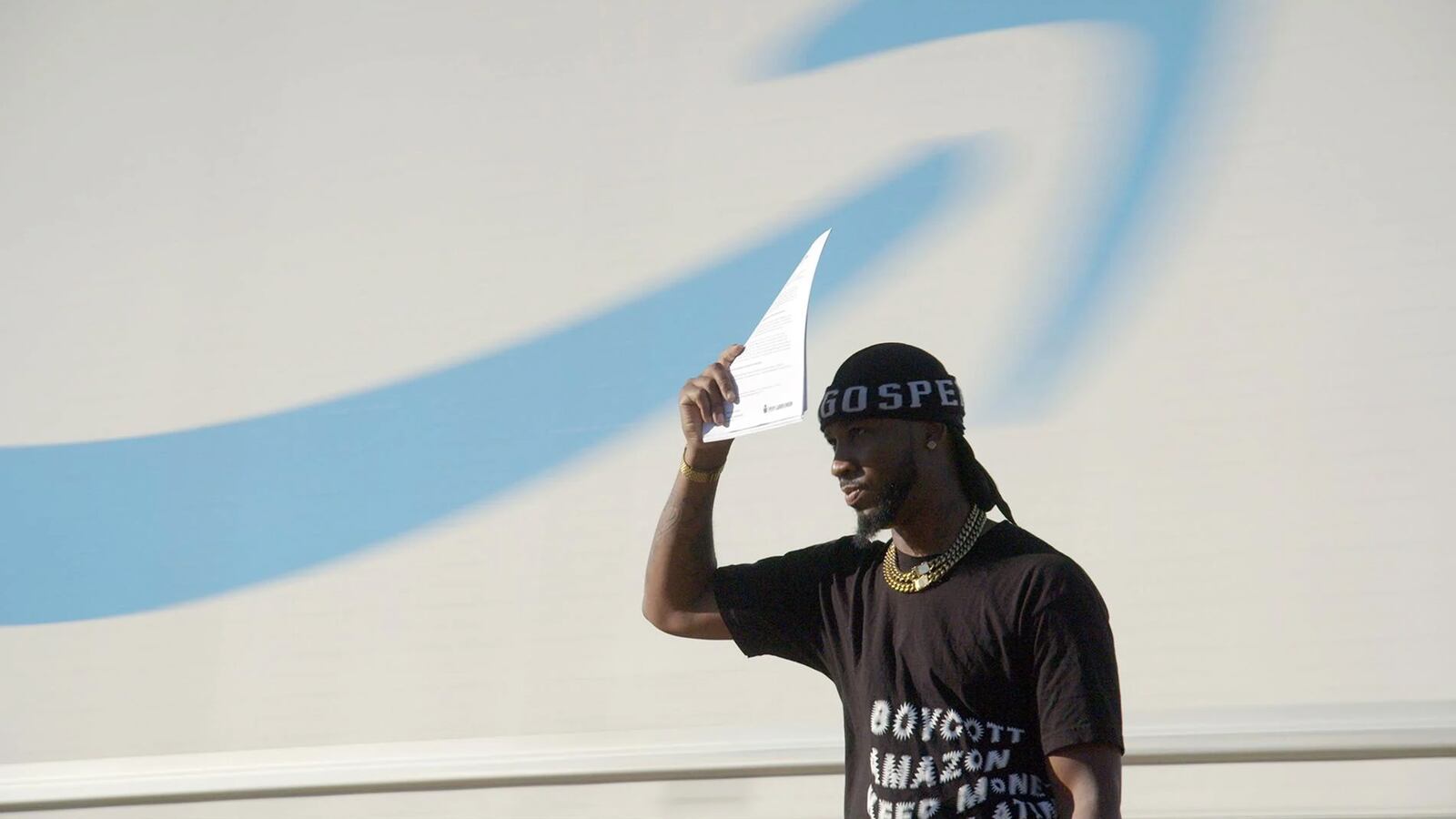Labor organizing has never been easy, and in their Sundance team-up Union, directors Brett Story and Stephen Maing explore exactly why that is. The even-handed documentary puts viewers at the heart of the Amazon Labor Union’s fight to drum up support among warehouse workers, drawing back the curtain on not only the company’s union-busting tactics, but also the fragile relationships within the union itself.
Union drops viewers in the middle of the action, largely forgoing the usual touches that help define a documentary’s narrative like one-on-one interviews. Just like there is no one protagonist in a union, the documentary declines to focus on one protagonist, centering itself instead around the Amazon Labor Union as a living, breathing, often conflicted organism.
Its leader, the charming Chris Smalls, does enjoy a fair amount of screen time, but so do discussions about his leadership, as some of his fellow union leaders begin to disagree with his tactics. While Story and Maing clearly respect the merits of Smalls’s fight, they also quietly highlight the ways he tends to alienate his peers. It’s unclear, however, why the directors declined to mention the lawsuit that union reformists filed against Smalls last summer, alleging that he’d blocked officer elections while suppressing dissenting members through attrition and threats. (Smalls called the complaint a “ridiculous claim with zero facts or merit” in a text message to the New York Times.)
At times, Union might leave you wishing for a little more direction or clarity, but overall, its detached, observational approach leads to a more broadly enlightening final product. Perhaps the most fascinating character in the film is Natalie Monarrez—an early ALU organizer who lives out of her car and eventually leaves the group after deciding it’s a “boy’s club” and that warehouse workers need more experienced representation. A couple of scenes within Union also examine the racial dynamics at play in these efforts when white (sometimes very new) union members speak over their comrades of color, including Smalls, even though they have been in the trenches for less time.
Intra-union arguments are to be expected, especially when fighting against a corporate behemoth like Amazon, and over time, viewers will see the stress build up as organizers work to rally their colleagues at the risk of their own jobs. At every turn, however, their grit and ingenuity is on full display—whether they’re sitting outside the warehouse in the cold passing out food and flyers, phone-banking thousands of people, or handing out free weed at a rally. And while Union wisely declines to weigh in on the merits of various players’ concerns and arguments, it is unequivocal in its depiction of what they’re up against.
As reported by The Hill, Amazon spent more than $14 million on consultants to, as the company put it in a court filing, express its “opinion on union representation, and to educate employees about the issues, election process and their rights under the law.” Union includes footage from multiple “captive audience” meetings that ran through all the usual union talking points—that workers will lose money from their paychecks to dues, that the union is an external group that will not adequately represent their interests, and that workers do not need a union to represent their needs.
As seen in the doc, multiple Amazon workers who attended those meetings to provide counterpoints later felt the company was targeting them with warnings and other disciplinary measures. The film also captures someone who appears to be an Amazon security worker filming Smalls and the ALU as they organize—which, he tells the worker multiple times, is illegal. Last January, the New York Times reported that a federal administrative judge had ruled that Amazon’s anti-union efforts had broken national labor law.
Union marks the first collaboration between Story (who previously helmed the feature docs The Prison in Twelve Landscapes and The Hottest August) and Maing, whose 2018 documentary Crime + Punishment won both a Sundance Special Jury Award and an Emmy Award. Together, the two have captured both the urgency and inescapable messiness that can define labor organizing.
Everyone involved in the ALU seems to understand how important their work is, and that passion is often what animates their disagreements. Union captures the exhilarating highs of their victories and the demoralizing, argument-inducing lows of their defeats. Ultimately, it also demonstrates that come what may, the ALU is in this for the long haul, with its eye fixed on the war ahead rather than any one individual battle.
That said, it’s hard to match the goosebump-inducing joy of the film’s climax, when the ALU finds out that they’ve officially won their election—a historic victory Amazon continues to appeal. Although Union can at times feel a little aimless, when Smalls and his union comrades huddle and cheer “ALU! ALU!” it’s hard not to feel that glee, too.






